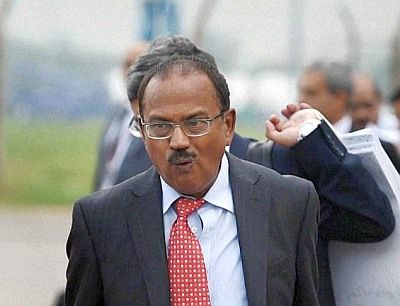 'Ajit Doval has done a splendid job in handling the Pathankot attack and certainly helped save heavy destruction of critical air force assets,' says Abhay Jere.
'Ajit Doval has done a splendid job in handling the Pathankot attack and certainly helped save heavy destruction of critical air force assets,' says Abhay Jere.
Ajai Shukla's column is another example of the pathological hatred within a section of armchair columnists towards Narendra Modi's establishment.
Shukla has certainly pretended to be objective while analysing the handling of terrorist attack on the Pathankot airbase, but he has purposefully chosen to overlook/ignore the facts which does not support his viewpoint. Moreover, he has labelled all the journalists praising the handling of the Pathankot attack as National Security Advisor Ajit Doval's 'cheerleaders'.
So now let us systematically dissect the various issues raised by Shukla to perpetuate his prejudice that the Pathankot terrorist attack was poorly handled by Doval and that he is incompetent to be the NSA.
The first and foremost aspect of the Pathankot attack was the availability of credible intelligence inputs before the actual attack. This itself a very positive sign as India has paid heavily in the past for not having credible and actionable intelligence inputs prior to any major terrorist attacks like the 26/11 Mumbai attacks.
Doval, being an ex-spy, certainly must have done something right to ensure that our intelligence system is geared enough to give credible inputs. Needless to say, if we didn't have the intelligence inputs, then the damage would have been far worse.
Moreover, the primary objective of these terrorists was to destroy our critical air force assets, but our armed forces ensured that they were not successful.
In his article, Shukla implied that Doval was casual in his approach and initially failed to understand the gravity and magnanimity of the problem. He also suggested that Doval initially restricted the role of the army and relied on hapless Defence Security Corps jawans, thus resulting in more casualties. This is absolutely not true.
On the contrary, after getting credible intelligence of an imminent terror attack on the base last Friday itself, a special forces team of the Indian Army along with two infantry columns (25 to 30 soldiers per column) of the army were deployed at the air base.
In addition, a team of the National Security Guard's Black Cat Commandos was also immediately deployed. More importantly, the overall command of the entire military operation was with a brigadier of the Indian Army and then with an NSG Inspector General (Operations).
Later, nine more columns of the army were moved in to ensure that the entire base was sanitised and completely under control. Doval was continuously monitoring the situation and for the very reason he cancelled his scheduled visit to China.
Shukla says that NSG commandos are not the first line of defence and not trained to protect assets like airbases and only trained to flushing out terrorists holed up in a house. He is not completely right. NGS commandos are special forces under the ministry of home affairs primarily trained for combating terrorism in every form. Their training is comprehensive and covers all aspects of countering terrorism and not just the holed up terrorist.
The NSG commandos are trained to conduct counter-terrorist tasks that include counter-hijacking tasks on land, sea, and air; bomb disposal (search, detection and neutralisation of IEDs); post blast investigation as well as hostage rescue missions. Anyway, during the Pathankot operation, NSG commandos were never the first line of defence.
Finally, Shukla talks about the delay (three days) in finishing the operations, especially the time taken to neutralise the last two terrorists who were holed up in a staff residential building. Now, according to Shukla, the NSG commandos are experts in tackling holed up terrorists, then questioning the delay in neutralising the last two holed up terrorists is to directly question the competence and ability of our NGS commandos.
It will be extremely unfair on our part to make judgments regarding the length of duration of an operation sitting inside air-conditioned chambers in far away locations, as we are still unaware of all the details which might have resulted in the delay.
It also could have been a strategic decision by the NSG to ensure that the terrorists are tired before making the final assault.
I completely agree with Shukla on a couple of minor points. First, the statements by the home minister in almost announcing the end of the operation without validating all the facts could have been avoided. Moreover, Home Secretary Rajiv Mehrishi's statements during Sunday's press briefing were quite insensitive and should have been worded more carefully.
Having said this, I have no hesitation in proclaiming that Doval has done a splendid job in handling the Pathankot attack and has certainly helped saved heavy destruction of critical air force assets.
Instead of mindless criticism just based on prejudice and conjecture, people like Ajai Shukla, who have no real experience or expertise in counter-terrorism operations, need to learn to give credit where it is due.
IMAGE: National Security Advisor Ajit Doval.
- Why the Pathankot op has gone on for so long
- 'With Pakistan, where is the question of trust?'
- The 3-fold moral of the story in engaging with Pakistan
- Our inward policy has cost us dearly
- How do we face future terror onslaughts?
- 'Very serious risk of a spectacular terrorist attack by ISI-backed groups'
- India-Pak talks: The time for realism is now!
- Pathankot attack: 'Someone' is unhappy with Modi-Nawaz talks
- Pathankot: India's response has to be measured
- 'Modi will continue the engagement with Pakistan'
- Preventing another Pathankot: A soldier's solution
- Pakistan will continue to support terrorists
- 'Terrorists are targeting security establishments'










